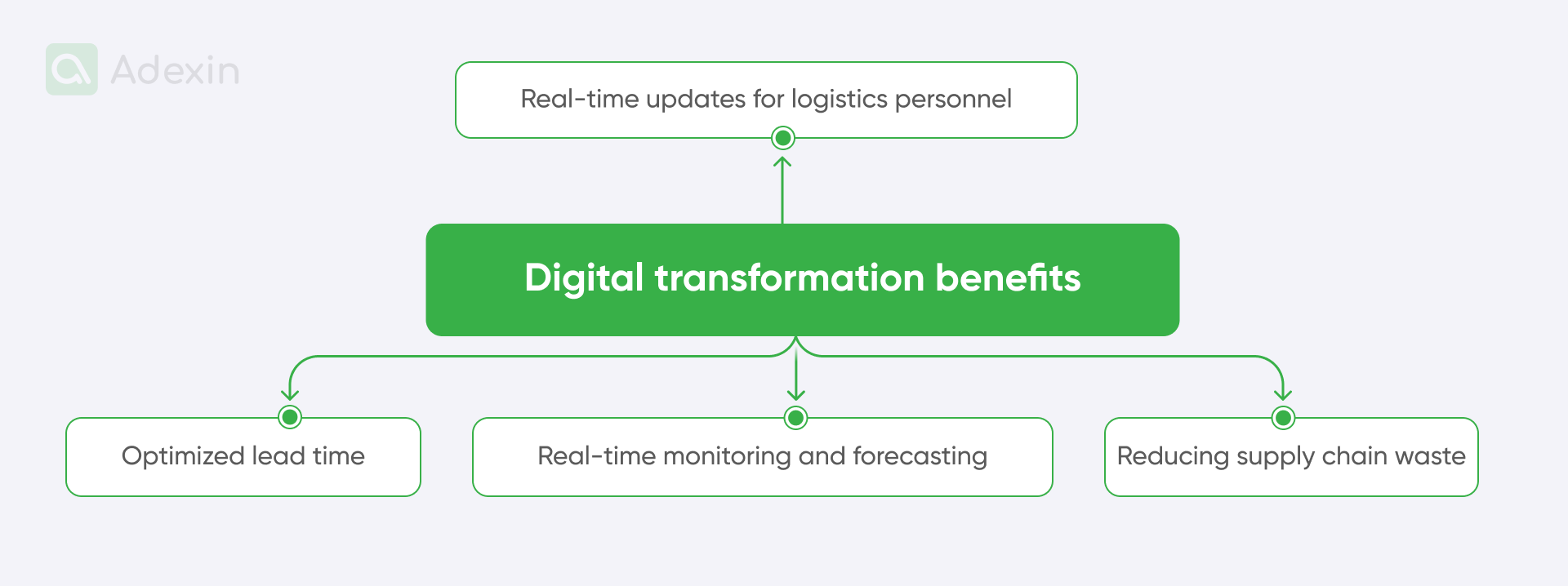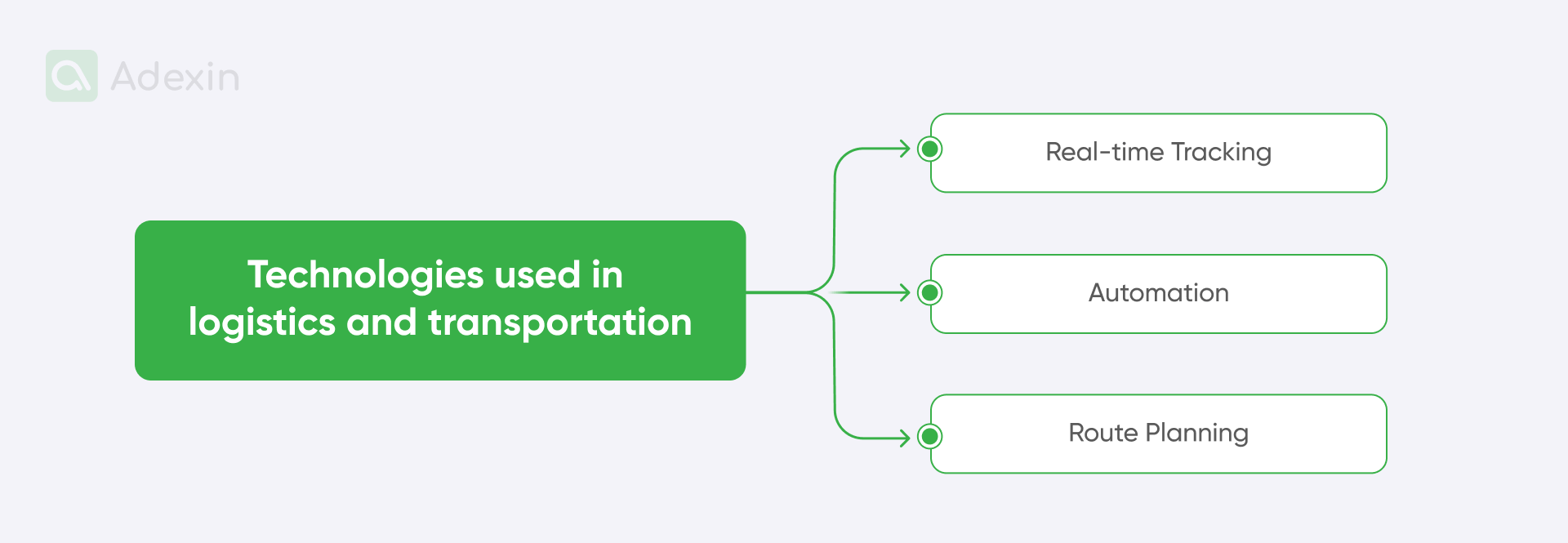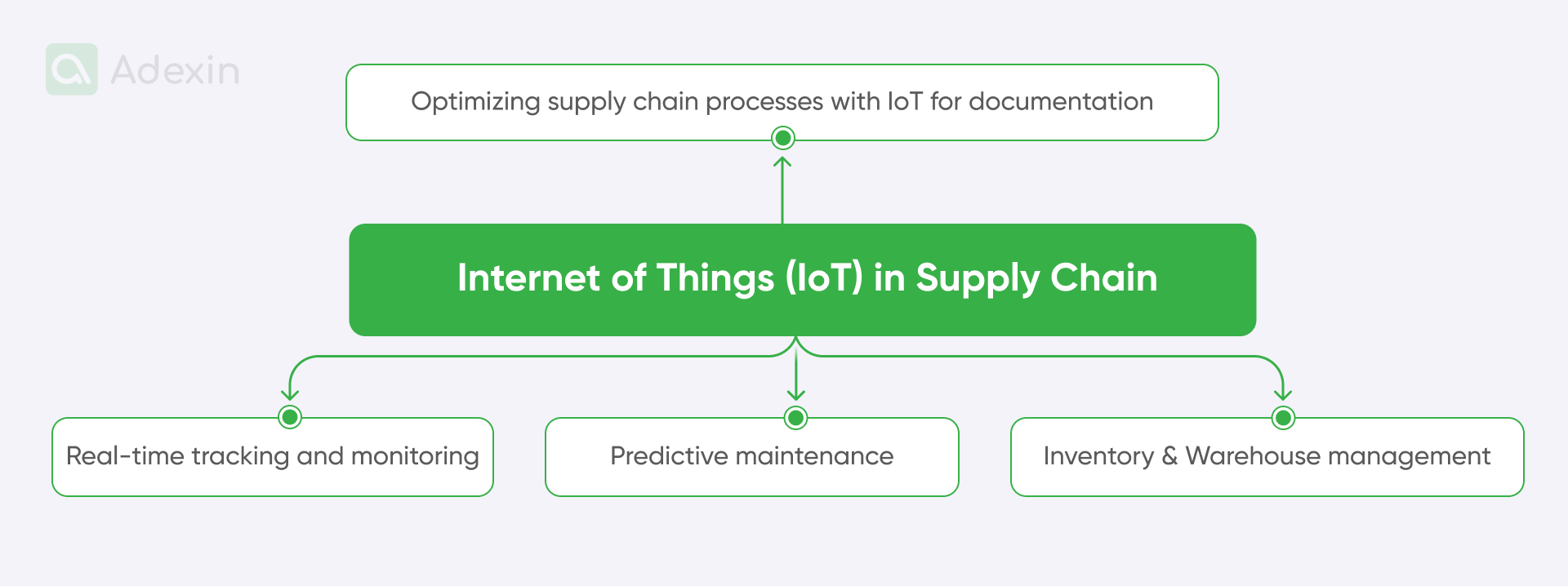Summary
Considering the supply chain, we should also think about its inherent components such as transportation and logistics. These two are inherent elements that influence the prosperity of today's small and medium-sized businesses. Technological development never occurs in isolation, and whatever is happening in one of the three industries, we can see indirect or direct influences on improving operations. Performance targets cannot be achieved without the involvement of each industry. This illustrates interdependencies between what happens in the warehouse, on the roads, and with sea or air freight. In this article, we share deeper insights into the technological developments in each industry. We have outlined the top five technology developments to better understand what you can achieve by implementing them.
What is the supply chain in technology?
Companies today aspire to steer their businesses towards technology. This approach is synonymous with multiple advantages for the company, as each technology is linked to innovations. These innovations manifest as direct benefits for all logistics, transportation, or supply chain companies. Here are the advantages and benefits that both small and medium-sized businesses and larger companies can gain by embarking on the digital transformation journey.
Optimized lead time
Digitizing the supply chain enables companies to optimize production lead times, providing better control over raw materials and production capacity. This approach is supported by transportation and logistics, with just-in-time or just-in-sequence, ultimately increasing production efficiency.
Real-time updates for logistics personnel
Digitization in Supply Chain (DSC) offers real-time updates for logistics professionals, helping them efficiently plan and redirect supply processes to customers. It also contributes to further customer retention, ensuring their satisfaction.
Reducing supply chain waste
Digitization effectively reduces waste in the supply chain. It enables frequent tracking of expiration dates in the warehouse, streamlining inventory, and materials management. This, in turn, reduces the need to maintain freight work because carriers do not process shipments.
Real-time monitoring and forecasting
Digitization in the supply chain enables real-time monitoring of trucks and shipping performance. Logistics and transportation companies can avoid delays and compare expected costs to actual costs without manual data registration into Excel sheets. Logistics professionals can use predictive analytics for more accurate forecasting models in supply chain management.

Why are new technologies in the supply chain important?
Supply chain management was one of the first business areas that adopted the benefits of ERP (Enterprise Resource System). Since then, the digital revolution has overtaken the entire industry and its connection to supply chain transportation and logistics. Companies can use custom software development services that help them manage huge networks without implementing ERP. Companies can integrate small solutions with their business systems without disrupting the environment. Today, these digital technologies don't only apply to large companies but are also available to small and medium-sized businesses.
Here are several points on why technologies are helping in the supply chain and beyond:
Technology enhances supply chain management by increasing visibility and improving operations.
Technological advancements are facilitating proactive anticipation of potential challenges.
Strategic tech investments push further collaboration and enhance data and information sharing.
What are transportation and logistics technologies to use?
Transportation and logistics are inherent parts of the supply chain, but the evolving complexity of each of those areas requires a separate solution. It refers to new fields where technology and innovation constitute completely separate developments. But it still influences seamless operations in the supply chain.
Here are a few technologies used in logistics and transportation:
Real-time Tracking
A key technology in transportation and logistics is real-time tracking. Businesses can monitor their shipments and goods seamlessly from origin to destination. This capability support also supports inventory management. Therefore, it empowers informed decision-making.
Automation
Automation plays a crucial role in transforming transportation and logistics processes. Companies can automate document workflows to improve order processing, inventory management, and shipment tracking with automated notification or other features.
Route Planning
Technology facilitates efficient route planning. This improvement contributes to reduced delivery times and helps with fuel cost savings. Route optimization software helps prevent traffic jams, road closures, and better copes with weather conditions. This not only leads to cost efficiencies but also enhances customer satisfaction.

Collaboration with IoT in supply chain management
The Internet of Things (IoT) is especially useful for helping companies connect their devices with equipment. This technology can offer plenty of support for supply chain, transportation, and logistics. Here is where IoT can deployed:
Real-time tracking and monitoring
Logistics and transportation utilize IoT equipment for Indoor and Outdoor Tracking in Supply Chain Operations.
Predictive maintenance
IoT Integration for Predictive Maintenance in Smart Supply Chains connecting sensors to predict machine Downtime and help avoid Supply Chain interruptions.
Inventory & Warehouse management
IoT sensors, RFID, and printed codes are implemented for automated inventory tracking.
Optimizing supply chain processes with IoT for documentation
IoT sensors allow recording and analyzing system performance at every stage of all processes. [1]

Software RFID in supply chain management
Radio-frequency identification (RFID) is a crucial supply chain management technology. It helps in both areas, such as transportation for scanning barcodes on the shipping documents and logistics for scanning locations and inventories in the warehouse.
Let's find out below how RFID technology influences your operations:
WMS and TMS Integration
Integrating RFID technology with Warehouse Management Systems (WMS) and Transport Management Systems (TMS) enhances the speed and accuracy of product tracking and shipments.
Product Handling Efficiency
RFID tags support route planning and efficient handling of goods within and between supply chain locations.
Inventory Counting Speed
RFID technology accelerates inventory counting and reconciliation by enabling employees to use mobile devices for accurate and rapid scanning.
Automate product receipt and distribution
Automation in warehouses is expedited through RFID technology. This allows for efficient goods receipt at inbound and inventory storage and picking orders, which streamlines distribution.
Optimize shipping and inventory processes
RFID technology supports optimizing the manufacturing process by providing real-time insights into the movement and status of products. It also optimizes goods outbound and helps better manage shipping space near the docks.
Modern logistics mobile apps
Absolute must-have technology in logistics and transportation is mobile devices supported by mobile apps. Mobility delivers multiple benefits to the entire supply chain and is also essential for logistics and transportation. Here are the areas where you can utilize mobile apps in your business.
Transport & Fleet Management
Mobile apps enable GPS Tracking for real-time location monitoring.
Online Booking and Tracking
Mobile devices can connect with a dedicated platform for online booking of transit or courier services.
Inventory Management
Mobile apps automate logging for error-free management of goods.
Parking Information
Real-time data on the nearest available parking slots.
Transport/Delivery Schedule Optimization
Mobile applications optimize travel routes for efficient delivery.
Functional 3PL TMS software
Management for third-party logistics (3PL) providers can be most effective when this functionality is embedded into TMS software. TMS software, recognized as a top technology for the supply chain, logistics, and transportation, was mentioned in fourth place as we focused on its built-in function for carrier procurement and better selection for 3PL.
Here is how the built-in function for 3PL in TMS software can help you manage your business:
Choose the most suitable routes and carriers.
Choose different modes of transportation from air, ground, and sea transport.
Evaluate carriers basically on prices.
Check compliance with sustainability laws and regulations.
Big and small fleet GPS tracking
Global Positioning System (GPS) enables logistics and transportation companies to operate more accurately. It provides better forecasting for overall operations and influences customer satisfaction by allowing businesses to be more transparent. Here is how GPS helps in logistics and transportation:
Precise asset tracking
GPS equipment tracking provides accurate location information on assets such as trailers and cargo containers. This way, you enable real-time adjustments and better communication with customers.
Fleet management insights
Advanced GPS equipment generates customized reports for fleet managers. GPS offers in-depth insight into cost-saving opportunities and operational efficiencies.
Fuel efficiency
GPS tracking optimizes fuel consumption by providing a satellite overview to adjust routes. You can reduce fuel loss during congestion.
Cost reduction
Real-time visibility and automation through tracking software reduce operating costs. That way, you can influence the effectiveness of your financial operations.
Theft prevention
GPS devices with open/close alerts facilitate rapid response to theft attempts. Authorities can be notified for quick vehicle recovery and counter large or smaller thefts from trailers and containers.
Benefits of supply chain logistics software
Many technology adoption success stories exist in today's logistics, supply chain, and transportation. Many companies have proven that regardless of their size—whether small or medium-sized businesses—they have extensively benefited from smaller or larger digital solutions for transportation and logistics embedded into their operations. Many companies have proven that regardless of their size—whether small or medium-sized businesses—they have extensively benefited from smaller or larger digital solutions embedded into their operations.
Although we already refer to each paragraph to the benefits delivered by each with the technologies above, we summarized all to give you a clear overview. Here is how your logistics, transportation, and supply chain business can benefit from these technologies:
GPS (Global Positioning System)
Enables real-time visibility for tracking goods and vehicles, and it's providing accurate location information. GPS improves route planning by optimizing routes to reduce fuel consumption.
IoT (Internet of Things)
Provides real-time tracking of products and assets throughout the supply chain. Allows predictive maintenance and improves inventory management through sensors installed at entry gates to ports or parking lots.
Function 3PL Built-in TMS Software
The 3PL function offers efficient procurement for carriers and freight forwarders. Enhances management within Transportation Management System (TMS) software.
Mobile Apps
Enables efficient management of drivers, schedules, tasks, and payments. Enhances customer experience with real-time tracking. In fact, mobility facilitates real-time communication between various stakeholders, improving collaboration.
RFID (Radio-Frequency Identification)
Provides product tracking through enhanced visibility by tracking the location of products and assets in real-time. It also speeds up inventory counting processes, leading to more accurate inventory management.
Final takeaway
We have mentioned various technologies that are crucial for overall business productivity. All of these approaches make it possible to adapt to ever-changing economic events. This is one of the reasons why digitization has become even more important in today's business environment.
At Adexin, we take care of our customers' business needs. We can lead your business through the market with the best-suited technologies embedded in transportation or logistics software. That's right. We do not offer you things you may not need in your business. We want you to be the most efficient in your industry regarding overall costs and quick return on investment. Choosing the right technology immediately becomes even more important for small or medium-sized businesses. Contact us today to see how custom software development can help you leverage your business.
References:
[1] Leading the IoT; Retrieved from: https://www.gartner.com/imagesrv/books/iot/iotEbook_digital.pdf
